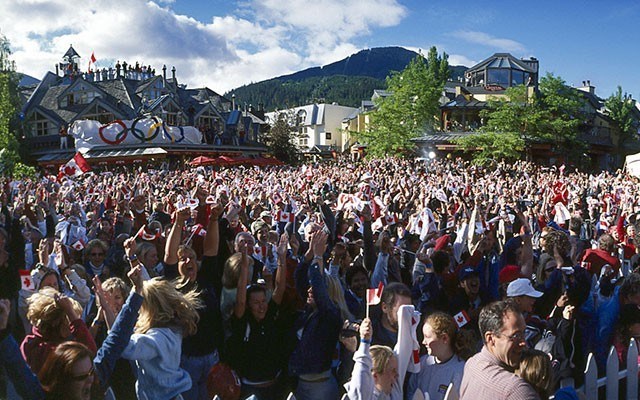It’s official: B.C. First Nations, Vancouver and Whistler will make a push to host the Olympic Winter Games in 2030.
The announcement came at a press conference hosted by the Lil’wat, Squamish, Musqueam and Tsleil-Waututh First Nations and the two potential host municipalities at the BC Sports Hall of Fame on Dec. 10.
In the joint press conference, the parties said they plan to "explore the feasibility of an Indigenous-led Olympic Games."
"In reflection, we have been at this place before, with the 2010 Olympics, where we showcased our presence and our cultures, respectively," said Lil'wat Chief Dean Nelson. "The difference between [now and] 2010 was we were an invitee at that time, and today we are a big part of the exploratory group to consider a bid for the 2030 Olympics."
Politically, the respective Nations have a greater presence and voice on their lands than they did 10 years ago, Nelson said.
"I also feel we are in a better place of inclusion in respect to political advancements since the previous Olympics," he said.
"I am looking forward to being part of this. I'm looking forward to the future."
Following short speeches from representatives of each First Nation and the two host communities, the parties signed a Memorandum of Understanding (MOU) committing to the prospect of exploring the bid.
The MOU is about "four nations inviting two municipalities to explore hosting the 2030 Games on their territories," said Vancouver Mayor Kennedy Stewart, adding that the agreement is about reconciliation.
"Today is not about 2010 and it's not even about 2030, it's about how we as settlers can reshape how we live on these unceded lands."
Collaboration agreements and an official bid could follow in 2022.
Being part of the announcement is one of the greatest privileges of his life, said Whistler Mayor Jack Crompton.
"I have a very real sense that my role is to follow, and I am ready to put my shoulder behind this effort and follow these leaders," Crompton said.
"And it is a deep, deep, deep privilege to be asked."
If successful, the bid will bring the Games back to Canadian soil exactly two decades after the 2010 Olympics in Vancouver and Whistler.
According to Whistler Sport Legacies CEO Roger Soane, the venues built for the 2010 Games—including the Whistler Sliding Centre and Whistler Olympic Park—are prepared to host the 2030 Games if the bid is successful.
“With our facilities, it will be very easy for us to say, ‘Come on in,’” Soane said in an interview last month. “We've got the only sliding centre in Canada; we have the only ski jumps in Canada, and we have one of the best Nordic facilities in the country as well. We have all the pieces to still facilitate seven events on our venues—it's a perfect fit.”
In terms of timing, hosting a second Olympics two decades after the first would be “just about right,” Soane said. Even by 2030, WSL’s venues will be in “relatively good shape,” he claimed. “But if you pushed it any longer, they may need a little bit more work.”
Though the International Olympic Committee hasn’t indicated when a decision will be made, it’s believed that the Japanese city of Sapporo is the current front-runner to host the 2030 Games. Salt Lake City, Utah (host of the 2002 Games) and Barcelona, Spain are also in the running.
The 2022 Olympic Winter Games begin Feb. 4 in Beijing, China. The 2026 Winter Games will take place in Milan-Cortina, Italy.
Check back for more as this story develops.
-with files from Megan Lalonde



